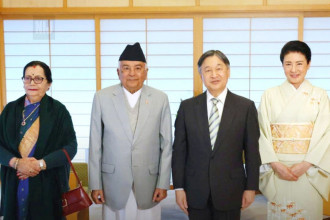KATHMANDU: The United Nations Development Programme (UNDP) Nepal, supported by the Nepal Economic Forum (NEF), has launched the Human Development Report 2025, “A Matter of Choice: People and Possibilities in the Age of Artificial Intelligence”, at a high-level event in Kathmandu.
The launch was followed by a panel discussion on “Making AI Work for Nepal” that convened government officials, policymakers, development partners, academics, private-sector representatives, civil society organisations, media, youth and students.
The report finds that global progress in human development has slowed to its lowest point in 35 years, with widening gaps between richer and poorer countries. It warns that Artificial Intelligence (AI) is a powerful yet double-edged instrument that must be steered carefully to promote inclusion and resilience.
At the event, UNDP Resident Representative to Nepal Kyoko Yokosuka said: “The global findings remind us that development gains cannot be taken for granted. In Nepal, our challenge is to harness digital transformation and AI not merely for innovation’s sake, but to deepen human development and ensure that no one is left behind.”
Minister of Communications and Information Technology Prithvi Subba Gurung observed that Nepal stands at a historic juncture, with AI redefining how people learn, work, govern and flourish. He outlined the government’s AI Vision, which places individuals at the heart of a resilient and adaptive digital transformation, prioritising inclusion over exclusion, empowerment over control and people over profits.
Alexandru Oprunenco, UNDP’s Regional Innovation Advisor, noted that while Nepal has raised its Human Development Index by 54% over the past 35 years, incomes remain low and gender disparities persist. He stressed the need to retain agency in designing and deploying AI technologies that augment human capabilities, tackle real development challenges and foster a more inclusive society.
The panel on “Making AI Work for Nepal” explored how digital transformation and AI can underpin inclusive growth, bolster citizen-centred state capacity and ensure equitable access across all provinces. Speakers emphasised the importance of adaptive, learning-based governance to harness emerging technologies.
Adesh Khadka, Joint Secretary at the Ministry of Communications and Information Technology (MoCIT), described plans for a National AI Policy alongside Digital Nepal 2.0 to integrate AI into agriculture, health and IT, and to catalyse large-scale job creation.
Parag Shrestha, Managing Director for South Asia and Head of Strategy at Fusemachines, highlighted Nepal’s talent, ambition and improving infrastructure as fertile ground for a competitive AI industry. He argued that, with investment, trust-building and public–private collaboration, AI could transform economic development and raise Nepal’s global profile.
Rob Fenn, Ambassador of the United Kingdom to Nepal, cautioned that Nepal must learn from others’ early missteps. He underlined the need for safeguards against misinformation and social fragmentation, and urged investments in digital literacy and AI preparedness to secure an AI-ready nation.
Sunaina Ghimire Pandey, President of Federation of Computer Association Nepal (CAN Federation), insisted that AI be made inclusive, accessible and trustworthy for all Nepalis, including women, students and marginalised communities. She called for government and private-sector investment in awareness programmes, digital literacy and infrastructure.
Moderator Sujeev Shakya, Chair of NEF, wove global perspectives, personal anecdotes and a sense of urgency into the discussion, urging stakeholders to collaborate on a forward-looking digital future for Nepal.
The event closed with remarks from Radhika Arayal, Secretary at the MoCIT, who noted that technology adoption has been uneven. She said that, if harnessed correctly, AI holds significant potential to deliver inclusive digital outcomes.
As Nepal prepares to expand its digital infrastructure, modernise service delivery and engage the next generation of innovators, UNDP Nepal reaffirmed its commitment to aligning technological innovation with inclusive human development and ensuring AI serves as a bridge to opportunity.



-1770135489.jpg)


